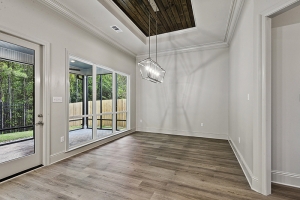No matter if you are a first-time homebuyer or this is one of many home purchases, it can be an exciting time. According to the National Association of Realtors, homeowners stay in their homes an average of 8 years before moving. Purchasing a home is a long-term investment, and you should take a moment to ask yourself these questions before making the purchase.

1. What can I comfortably afford?
When you are considering what is comfortable for you to spend each month, this doesn’t just include your mortgage payment, but other home expenses as well. These additional expenses include taxes, homeowner’s insurance, homeowner’s association dues, utility cost and maintenance. A good rule to follow is to make sure that all your expenses which include your total house payment, taxes and insurance should be below 28% of your gross monthly income.
2. Which loans do I qualify for?
In order to figure this out, you will need to already have a lender. Your lender can go through all of the options and help you weigh the pros and cons of each. For example, if you want to have a monthly payment that stays the same, you would want to go with a conventional fixed-rate mortgage.
3. How much will you need for your down payment?
A lender can help factor in what kind of loans you will qualify for which in turn will determine your down payment. A VA loan requires a low down payment and in some circumstances no down payment at all. Other loans such as a conventional loan like to have a 20% of the home’s purchase price as a downpayment. On some loans, a higher down payment can lower your monthly payments and your interest rate.
4. What’s PMI? Do I have to pay it?
PMI is also known as private mortgage insurance and is required on many loans if the down payment is less than 20% of the home’s sale price. For example, if you do obtain a conventional loan and put less than 20% down, you will also have to pay PMI. Once you pay your loan down, your PMI can come off.
5. What interest rate do I qualify for? How can I lower it?
Your mortgage interest rate is very important in the life of your loan as it has a direct impact on your monthly payment. When you are shopping around for a lender, compare their APR (annual percentage rate) and their lender fees. Once you have chosen a lender, they can help you with ways to lower your interest rate.
6. What will my monthly payment be?
A lender can estimate your monthly payment based on the purchase price of a home, your down payment and your interest rate. There are also tons of monthly mortgage payment calculators online that can help you with a ballpark figure of how much you will pay a month.
7. What are the closing costs?
Closing costs include origination fees, discount points, appraisal, document preparation, title insurance, and home inspection. Closing costs run anywhere from 2% to 5% of your loan amount. Before you close on your home, your lender will provide you with an itemized list of estimated closing costs.
8. How long will the closing process take?
You want to make sure to give yourself enough time to get your financing in order, so put a reasonable closing date on your offer. Obtaining financing and getting everything in order for your home to close can take between 30 to 60 days.
If you are in the market for a new home, now is a great time to ask a real estate agent for their expertise. They can not only help you with the home-buying process, but will also be able to direct to a good lender.
No comments:
Post a Comment